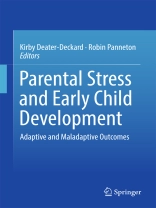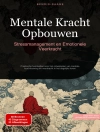This book examines the complex impact of parenting stress and the effects of its transmission on young children’s development and well-being (e.g., emotion self-regulation; executive functioning; maltreatment; future parenting practices). It analyzes current findings on acute and chronic psychological and socioeconomic stressors affecting parents, including those associated with poverty and cultural disparities, pregnancy and motherhood, and caring for children with developmental disabilities. Contributors explore how parental stress affects cognitive, affective, behavioral, and neurological development in children while pinpointing core adaptation, resilience, and coping skills parents need to reduce abusive and other negative behaviors and promote optimal outcomes in their children. These nuanced bidirectional perspectives on parent/child dynamics aim to inform clinical strategies and future research targeting parental stress and its cyclical impact on subsequent generations.
Included in the coverage:
- Parental stress and child temperament.
- How social structure and culture shape parental strain and the well-being of parents and children.
- The stress of parenting children with developmental disabilities.
- Consequences and mechanisms of child maltreatment and the implications for parenting.
- How being mothered affects the development of mothering.
- Prenatal maternal stress and psychobiological development during childhood.
Parenting Stress and Early Child Development is an essential resource for researchers, clinicians and related professionals, and graduate students in infancy and early childhood development, developmental psychology, pediatrics, family studies, and developmental neuroscience.
Jadual kandungan
Chapter 1: Overview and Introduction.- Chapter 2: Prenatal Maternal Stress and Psychobiological Development in Infants.- Chapter 3: Parental Stress and Epigenetic/Nongenetic Pathways to Altered Phenotypes.- Chapter 4: Antenatal Depression, Anxiety, and Parental Stress.- Chapter 5: Neurobiological Basis of Parenting Disturbances.- Chapter 6: How Being Mothered Affects the Development of Mothering.- Chapter 7: Linking Parental Stress and Poor Emotional Self-Regulation in Infants and Children.- Chapter 8: Infant s Temperament and Parental Stress.- Chapter 9: Relating Parental Stress to Emergent Executive Function and Self-Regulation in Infants and Children.- Chapter 10: Parenting Stress, Child Maltreatment, and Child Development.- Chapter 11: The Stress of Parenting Children with Developmental Challenges (Autism, Down Syndrome, Attention Deficit).- Chapter 12: Negative Effects of Parenting Stress on Parenting Efficacy.- Chapter 13: Poverty and Parenting Stress.- Chapter 14: Parenting Stress and Adult Development.- Chapter 15: Contextual and Cross-Cultural Perspectives on Parenting Stress.
Mengenai Pengarang
Kirby Deater-Deckard, Ph.D., is Professor of Psychological and Brain Sciences at the University of Massachusetts Amherst, , and a Fellow of the Association for Psychological Science. Dr. Deater-Deckard conducts research and teaches courses on biological and environmental influences on individual differences in social-emotional and cognitive development in childhood and adolescence. The emphasis in this work is on intergenerational transmission, gene-environment mechanisms, and home and school environments. His publications span developmental and family sciences and developmental psychopathology areas, with research currently and previously funded by NSF and NIH. Applications focus on parenting stress: identifying its antecedents and consequences, its adaptive and maladaptive features, and implications for parenting prevention and intervention programs. In his current collaborative work on parenting, he is examining maternal cognitive and physiological self-regulation and its role in parenting stress and harsh caregiving, in the face of challenging child behavior and contextual stressors.
Robin Panneton, Ph.D., amily: is Associate Professor of Psychology, member of the Faculty of Health Sciences, and an affiliated member of the School of Neuroscience at Virginia Tech. Dr. Panneton conducts research on the processes and mechanisms of how infants learn to communicate in the first two years after birth. Predominantly, she is interested in how information available from caretakers is attended to, processed, and remembered by infants as they begin their pathways to being language users. With the support of funding from NICHD and the James S. Mc Donnell Foundation, she has looked at voice recognition, processing of intonational contours, integration of information across facial and vocal displays, attention modulation via emotional information in speaker’s faces and voices, and early indicators of individual differences in learning styles as they relate to emerging language skills in low- and high-risk infants. In her teaching, she has concentrated on dynamic systems view of development, epigenetics, pre- and post-natal contributions to early human development, language learning, and the development of attention in infancy and early childhood.












